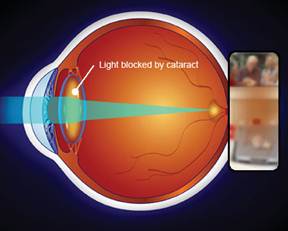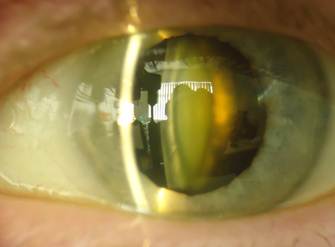A cataract is usually an age-related misting or clouding of the lens of the eye, and will affect most people over the age of 50 at some time in their lives. The cause may also be trauma (e.g. accidental damage to the eye) or cataracts may develop secondary to a medical condition such as diabetes.
Cataracts cause a gradual and progressive blurring of vision. They can alter the focusing properties of the eye (requiring more frequent changes of spectacles) and also cause glare around bright lights (e.g. car headlights or the setting sun). Sometimes people notice a change in colour appreciation, or that things appear less bright.

Your GP may be able to diagnose your cataract, but often it is your optician who is best placed to detect signs of cataract. This may be during your routine annual eye examination, or if you attend specifically because you have noticed the symptoms described above.

Whilst cataracts do not always require treatment, advice should be sought if you are experiencing any of the symptoms described above. Where necessary your cataract can be dealt with quite quickly by an experienced Consultant Ophthalmic Surgeon who will remove the cataract (the central cloudy part of the lens) and replace this with a clear, plastic lens. This operation, when performed by an experienced surgeon, is relatively quick and usually very successful in restoring vision. This is one of the most frequently performed operations in the world.
Expert surgeons use advanced micro-incision surgical techniques, with the latest in replacement lens implant technology.
At Manchester Eye Surgery we are able to take things to the next level, offering the latest in bladeless Laser Cataract Surgery.
During the early stages of their development, cataracts can sometimes be observed, so long as they are not causing too many symptoms.
Cataracts can cause a change in spectacle prescription (usually causing myopia) and new spectacles may improve vision for a short period of time. However, it is not unusual for rapid and frequent changes in spectacle prescription to occur.
The only way of actually treating cataract successfully is surgical removal of the cataract. The surgery can be carried out quite quickly by an experienced Consultant Ophthalmic Surgeon who will remove the cataract (the central cloudy part of the lens) and replace this with a clear, plastic lens. This operation, when performed by an experienced surgeon, is relatively quick and usually very successful in restoring vision. This is one of the most frequently performed operations in the world.
Expert surgeons use advanced micro-incision surgical techniques, with the latest in replacement lens implant technology.
At Manchester Eye Surgery we are able to take things to the next level, offering the latest in bladeless Laser Cataract Surgery.
The eye can be compared to a camera. At the front of the eye is a clear window called the cornea and a short distance behind this is the lens. The lens is a usually clear structure, located behind the pupil, and it plays a very important part in focussing light onto the retina at the back of the eye. The retina can be compared to the film in an old-style camera, and is responsible for processing and transmitting visual information to the brain.
As we age, the lens often becomes cloudy and less light is then able to pass through it, giving the effect of looking through frosted glass. Patients complain that their vision is cloudy or misty and colours appear less bright. The lens also loses the ability to focus light sharply on the retina. These problems are due to the development of cataract.
How can I tell if I have a cataract?
Cataracts usually cause a slow, gradual and progressive blurring of vision. They can alter the focussing properties of the eye (thus requiring more frequent changes of spectacles) and also cause glare and starbursts around bright lights (e.g. car headlights or the setting sun). Sometimes people notice that things appear less bright, or a change in colour appreciation. Your optician is usually best placed to detect signs of cataract. This may be during your routine annual eye examination, or if you attend specifically because you have noticed the symptoms described above.
Cataracts do not always require treatment, but advice should be sought if you are experiencing any of the symptoms described above.
When should I have cataract surgery?
If your cataract has progressed to the point where it is interfering with your vision, then surgical removal may be recommended. In the past, it was often considered that Cataracts need to have progressed to a particular level of “maturity” before surgery is indicated. This is no longer the case. Modern techniques allow us to operate as soon as the cataract is impairing your vision to a level where it is affecting your lifestyle. Sometimes your vision may be reduced to the point that it no longer meets the legal standards for driving, and therefore surgery may be essential.
How is a cataract treated?
Treatment by an experienced Consultant Eye Surgeon enables removal of the cataract (the central cloudy part of the lens) and its replacement with a clear, plastic lens. This operation, when performed by an experienced surgeon, is relatively quick and usually very successful in restoring vision. It is one of the most frequently performed operations the world over.
Modern techniques for the careful planning of this surgery, accompanied by advanced micro-incision surgical techniques with the latest in replacement lens implant technology, mean that excellent and highly predictable results are the norm. Laser Cataract Surgery further increases the predictability and safety of this procedure. In addition to this, Mr Ikram is also able to offer you the most advanced accommodative and multifocal premium lens technologies.
Can cataracts be prevented?
Cataract development is usually age-related. As such, there is no proven method for preventing cataract development and no proven treatment other than surgery. However, as cataracts frequently develop with age, it is important to have regular eye examinations, as we get older. This should be done, preferably through a dilated pupil, every 1 – 2 years.
Your optometrist or eye surgeon may also be able to detect signs of other conditions such as glaucoma and age-related macular degeneration.